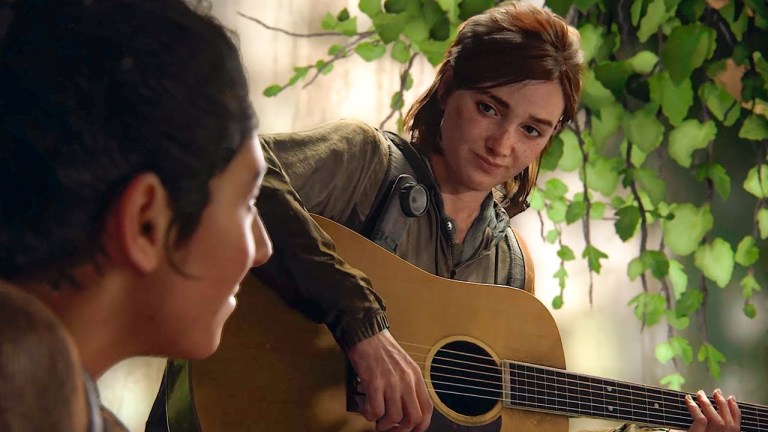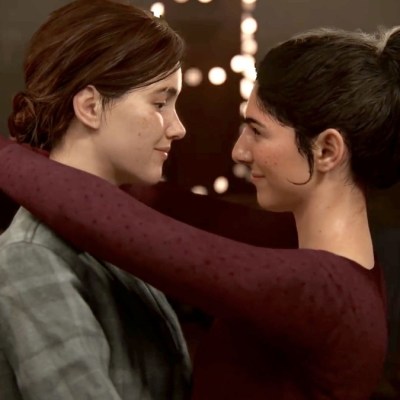Why The Last of Us Part 2 Is Actually a Story About Love Conquering Hate
The Last of Us Part 2, while bleak, gruesome, and extremely violent, is ultimately a story about love. We break down how both games tell this story and Joel and Ellie find closure.

This The Last of Us Part 2 article contains spoilers.
The very last thing you hear after completing The Last of Us Part 2 is Ellie and Joel singing a dirge-like, acoustic rendition of “The Wayfaring Stranger,” a folk song so old that it’s unknown exactly where it originated (though it’s famously been covered by countless artists including Jack White, Dolly Parton, and Johnny Cash). It tells a lonesome tale of a person traveling through a “world below,” trudging through darkness to reunite with their loved ones in a place of love and peace beyond.
I’m just a poor wayfaring stranger
Traveling through this world below
There is no sickness, no toil, nor danger
In that bright land to which I go
I’m going there to see my father
And all my loved ones who’ve gone on
I’m just going over Jordan
I’m just going over home
The timeless elegy is a poignant way to wrap up the two-part The Last of Us saga because the story’s three protagonists — Joel, Ellie, and Abby — each walk their own dark paths, haunted by the ghosts of the people they’ve lost (and killed) along the way. By the end of the story, two of them reach a place of closure, the figurative “home” from the song. One, however, may still have a long road ahead of them.
To better understand the characters and themes that drive The Last of Us, let’s take a look at Joel, Elllie, and Abby’s respective trajectories, examining the tough decisions they made along the way, how they dealt with the repercussions, and how, in the end, love wins out over hate.
Joel
Joel’s journey starts with the tragic death of his daughter, Sarah, in the unforgettable, heart-wrenching opening sequence of The Last of Us. It’s a devastating event that traumatizes him, well, forever. That’s one of the pervading themes of The Last of Us — sometimes, bad things happen to people, and they never get better. People just do their best to deal with the pain, and that’s exactly what Joel does.
When Marlene tasks Joel and Tess with escorting young Ellie across the country, he’s apprehensive at first. When Tess dies and he’s left to carry out the mission on his own, however, he begins to warm up to Ellie and realize that she fills the void Sarah left behind. “Baby Girl,” he calls her, his old nickname for Sarah.
Joel grew to love Ellie so much that, by the end of the first game, he’s willing to essentially let the world burn to save her life, taking her from the Fireflies’ hospital where they hoped to engineer a vaccine that could cure the Cordyceps fungal virus and save millions of lives. And he kept the truth of their escape from Ellie because — and this is the sickest part — he knew deep down that she was willing to die on that operating table. But he just couldn’t let her go, killing the Firefly doctor who we find out later is Abby’s father in the process.
If Joel doesn’t make the catastrophic decision at the end of the first game, none of the events of The Last of Us Part 2 happen. The entire second game revolves around that fateful moment — it’s the anchor point for the entire saga. Joel doomed millions of people to death that day, but on a more personal level, he sent Ellie and Abby on their own paths of self-destruction, tragically altering their lives forever.
In a flashback scene at the end of The Last of Us Part 2, Ellie confronts Joel about what he did that day. “I was supposed to die in that hospital,” she says. “My life would have fucking mattered. But you took that from me.” Joel confesses that despite her resentment toward him, he regrets nothing. “If somehow the Lord gave me a second chance at that moment…I would do it all over again,” he confesses tearfully, almost proudly. How could he feel this way knowing this decision cost so many lives and ultimately cost Ellie her innocence?
But there’s another way to look at it. What Joel did wasn’t right — it was frankly disgusting. But keep in mind, on his journey, he was never motivated by vengeance — only love. He agreed to take Ellie across the country to the Fireflies as a promise to Tess, who he loved. And he stole Ellie from that operating table because he loved her, just like he loved Sarah. Even when he killed Marlene, he didn’t do it out of hatred — he was doing it to save Ellie. “You’d just come after her,” he says just before pulling the trigger.
However twisted, selfish, and unjustifiable Joel’s actions were, in his mind, he was doing right by Ellie, the person he loved most. In his final moments on the earth, laying bloodied at the hands of Abby, looking into Ellie’s eyes, he leaves the world comforted, knowing that despite living a life mired by death and tragedy, he harbors no regrets for all of the bad things he did because he did it all for her. For him, “home” is wherever Ellie is.
So, I’m just going over Jordan
I’m just going over home
Abby
Joel’s actions weren’t motivated by revenge, but they did unfortunately set Abby on a path of vengeance against him. When we meet her she’s obsessed with making Joel pay for killing her father in that operating room, and we later learn that she dragged all of her friends into the assassination mission, ultimately dooming them to their deaths at the hands of a vengeful Ellie.
Abby seems hopelessly caught in a downward spiral of tragedy and loss. In a series of flashbacks, we learn that she and Owen were once lovers, but that her obsession with hunting down Joel pushed him away. He eventually ends up with Mel, who he plans to relocate to Santa Barbara with to start a new life with their unborn child, rejoining what’s left of the Fireflies. Owen and Mel are killed by Ellie before any of that happens, but in reality, they were already on their way out of Abby’s life, another tragic consequence of her fixation on Joel and the loss of her father.
For a long time, Abby is cursed, consumed with anger and malice, and it doesn’t seem like she’ll ever be able to let go of that hate. But then she meets Lev, someone who is pure, hopeful, and worth giving her life for. She may have cost her old friends their lives, but in Lev, she finds an opportunity to no longer allow hatred and resentment to lead her life. “You’re my people,” she tells him as they flee Scar Island following the tragic death of Lev’s mom and his sister, Yara. They’ve both lost everything, but now they have each other.
Later, when Abby has Ellie and a pregnant Dina dead to rights at the theater, she comes dangerously close to making a huge mistake — killing Ellie is one thing, but Dina and her unborn baby are wholly innocent. Mercifully, she spares their lives thanks to Lev, who inspires her to end the cycle and let go of her deadly obsession. Abby is freed from the ghosts of her past, choosing to now dedicate her life to protecting and loving Lev, her new family.
Later, when Ellie confronts Abby on the beach at the end of the game, Abby has clearly left her hatred behind — the only reason she agrees to fight Ellie is because Lev’s life is threatened. When Ellie eventually lets them go, it’s clear that Abby is finally in a good place in her life.
I know dark clouds will gather ‘round me
I know my way is hard and steep
But beauteous fields arise before me
Where God’s redeemed, their vigils keep
Ellie
Joel and Abby’s stories end with them living for the ones they love. They’ve surely done horrible things, but by the end of The Last of Us Part 2, they’ve found closure. Ellie’s fate is a little hazier, though. Much like the ending to The Last of Us, the second game concludes in poetic fashion, giving a resolution to Ellie’s story that’s wide open for interpretation.
In the first game, Ellie risked her life, traveling thousands of miles for a chance to make the world a better place. All she ever wanted was to help others, and her conscience was clean.
But when she watched Joel perish in front of her eyes at the hands of Abby, that all changed. Like Abby, she was consumed by revenge, nothing but murder on her mind. Visions of Joel taking his last breaths, his face a crimson mask, haunt her so deeply that she leaves Dina and baby JJ behind to find and kill Abby once and for all. The fact that she’s started a family with the love of her life, living safe and sound out in the middle of nowhere, and still can’t let go of Abby and Joel is a disturbing illustration of just how permanently damaged she is on the inside.
There is hope that Ellie may be able to come back from the brink, though. In the flashback to her heart-to-heart with Joel on the porch, when he confesses that he doesn’t regret taking her from the Fireflies, she tells him, “I don’t think I can ever forgive you for that…But I would like to try.”
And she does try. At the end of the game, when Ellie is choking the life out of Abby on the beach, she stops when she sees a vision of Joel. Not the bloody vision that’s haunted her for so long, but rather an image of him sitting peacefully on the porch, playing his guitar. It’s in this moment that Ellie finally forgives — or begins to forgive — Joel for what he did. She knows what he did was wrong, but she also knows that he did it because he loved her.
Being consumed by anger, hatred, and resentment for so long caused Ellie to lose everything, including Dina and JJ, who are gone by the time she gets back to their farm. But in the closing shot of the game, we see her walk away from the guitar Joel gave her all those years ago. Perhaps it symbolizes her finally leaving Joel’s ghost to rest (unlike Tommy, who by the end of the game becomes an ominous, ugly representation of what Ellie could become were she unable to move on). She sings:
So I’m just going over Jordan
I’m just going over home
According to Christian faith, the Israelites crossed the River Jordan to make it to the Promised Land. It’s also where Jesus was baptized, washed of sin. Joel and Abby seem to have made their way across the rapids, and perhaps Ellie has yet to make it to the other side. But at least now she’s moving in the right direction.


